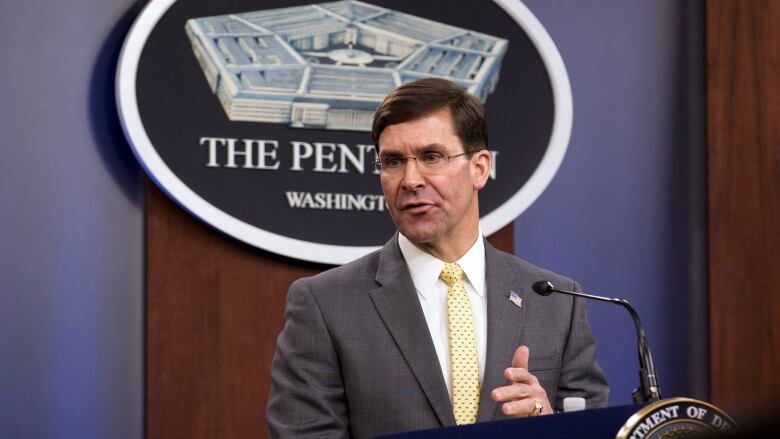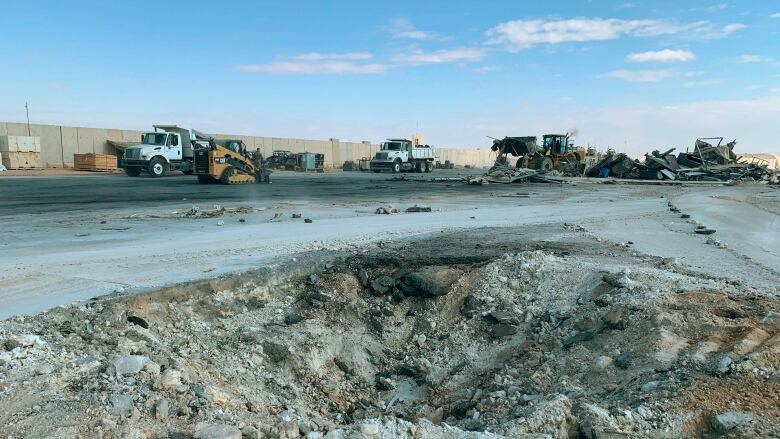Pentagon chief defends Trump over comments on brain injury cases
Number of service members diagnosed since Iran's missile strike has risen to 64

U.S. Defence Secretary Mark Esper on Thursday defended President Donald Trump's response to American troopsbeing diagnosed with traumatic brain injuries from Iran's missile strike, saying he cared about the servicemembers, as the number of servicemembers diagnosed increased to 64.
Last week, Trump appeared to play down the injuries, saying he "heard that they had headaches and a couple of other things," prompting criticism from lawmakers and a U.S. veterans group.
Of the 64 service members who have been diagnosed, 39 had returned to duty, the military said.
"I've had the chance to speak with the president. He is very concerned about the health and welfare of all of our service members, particularly those who were involved in the operations in Iraq, and he understands the nature of these injuries," Esper said during a news conference on Thursday.
Army Gen. Mark Milley, chairman of the military's Joint Chiefs of Staff, said the service members suffering from traumatic brain injuries had been diagnosed with mild cases. He added the diagnosis could change as time went on.
Pentagon officials have said there had been no effort to minimize or delay information on concussive injuries, but its handling of the injuries following Tehran's attack has renewed questions over the U.S. military's policy regarding how it deals with suspected brain injuries.
"[Traumatic brain injury]manifests itself over time. I still believe that morning there were no casualties reported," Esper said.
Veterans group wants apology
Since 2000, about 408,000 service members have been diagnosed with traumatic brain injury, according to Pentagon data.
Democratic congressman Bill Pascrell Jr. of New Jersey, a founder of the Congressional Brain Injury Task Force, faulted Trump for displaying "a clear lack of understanding of the devastating impacts of brain injury."
The advocacy groupVeterans of Foreign Wars called on Trump to apologize "to our servicemen and women for his misguided remarks."
The injuries have often been dismissed in part because the problem is not fully understood, although the Pentagon began focusing on the problem in the early 1990s when it established a head injury program that grew into today's Defence and Veteran's Brain Injury Center. Among its work, the centre provides published reviews of research related to TBI, including links between severe TBI and behavioural issues such as alcohol abuse and suicide.

A study published this month by University of Massachusetts Amherst health services researchers concluded that military members who suffered a moderate or severe TBI are more likely than those with other serious injuries to experience mental health disorders.
The Center for a New American Security, a Washington think-tank, released a study urging the Pentagon to conduct a blast surveillance program to monitor, recordand maintain data on blast pressure exposure for "any soldier, in training or combat, who is likely to be in a position where he or she may be exposed to blasts." It said this should include brain imaging of soldiers who have been exposed to blasts as part of the study to better understand how blasts affect the brain.
Iran fired missiles at the Ain al-Asad base in Iraq on Jan. 8 in retaliation for the U.S. drone strike killing five days earlier of top Revolutionary Guard Gen.Qassem Soleimani.
The missile attacks capped a spiral of violence that had started in late December. Both sides have refrained from further military escalation.
The Pentagon did not announce the first confirmed cases until more than a week after the Iranian attack; at that point it said there were 11 cases, raising that number to 34 last week and then 50 earlier this week.
The question of American casualties took on added importance at the time of the Iranian strike because the degree of damage was seen as influencing a U.S. decision on whether to counterattack and risk a broader war with Iran. Trump chose not to retaliate, and the Iranians then indicated their strike was sufficient for the time being.
With files from The Associated Press and CBC News












_(720p).jpg)


 OFFICIAL HD MUSIC VIDEO.jpg)
.jpg)



























































































